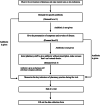Sale of WHO AWaRe groups antibiotics without a prescription in Pakistan: a simulated client study
- PMID: 32774870
- PMCID: PMC7397594
- DOI: 10.1186/s40545-020-00233-3
Sale of WHO AWaRe groups antibiotics without a prescription in Pakistan: a simulated client study
Abstract
Introduction: Resistant strains of bacteria are rapidly emerging with increasing inappropriate use of antibiotics rendering them less efficacious. Self-purchasing of antibiotics particularly for viral infections is a key driver of inappropriate use, especially in lower- and middle-income countries. There is a particular issue in countries such as Pakistan. Consequently, there is a need to assess current rates of self-purchasing especially for reserve antibiotics to guide future policies.
Aims: Assess the extent of current antibiotic sales without a prescription in urban areas of Pakistan.
Methodology: A multicenter cross-sectional study was conducted in different areas of Punjab, Pakistan using Simulated Client technique. The investigators demanded different predefined antibiotics from WHO AWaRe groups without prescription. Three levels of demand were used to convince the pharmacy staff in order to dispense the antibiotic without a prescription. A data collection form was completed by simulated clients within 15 min of each visit.
Results: Overall 353 pharmacies and medical stores were visited out of which 96.9% pharmacies and medical stores dispensed antibiotics without demanding a prescription (82.7% at demand level 1 and 14.2% at demand level 2), with only 3.1% of pharmacies refusing to dispense antibiotics. The most frequently dispensed antibiotic was ciprofloxacin (22.1%). Surprisingly, even the reserve group antibiotics were also dispensed without a prescription. In only 25.2% visits, pharmacy staff guided patients about the use of antibiotics, and in only 11.0% pharmacists enquired about other medication history.
Conclusion: Currently, antibiotics are easily acquired without a legitimate prescription in Pakistan. There is a need for strict adherence to regulations combined with a multi-dimensional approach to enhance appropriate dispensing of antibiotics and limit any dispensing of WHO restricted antibiotics without a prescription.
Keywords: Antibiotics; Pakistan; Sale without prescription; Simulated client.
© The Author(s) 2020.
Conflict of interest statement
Competing interestsThe authors declare that they have no competing interests.
Figures
Similar articles
-
Assessment of without prescription antibiotic dispensing at community pharmacies in Hazara Division, Pakistan: A simulated client's study.PLoS One. 2022 Feb 17;17(2):e0263756. doi: 10.1371/journal.pone.0263756. eCollection 2022. PLoS One. 2022. PMID: 35176043 Free PMC article.
-
Pattern of antibiotic dispensing at pharmacies according to access, watch, reserve (AWaRe) classification: multicenter study after COVID-19 waves in different districts of Pakistan.BMC Res Notes. 2025 Jan 27;18(1):38. doi: 10.1186/s13104-024-07030-0. BMC Res Notes. 2025. PMID: 39871298 Free PMC article.
-
The Extent of Antibiotic Dispensing in Self-Medication Encounters in Sudan: A Simulated Patient Study Focusing on Cefixime Sale.Integr Pharm Res Pract. 2023 Nov 24;12:227-237. doi: 10.2147/IPRP.S440010. eCollection 2023. Integr Pharm Res Pract. 2023. PMID: 38033381 Free PMC article.
-
Current rates of purchasing of antibiotics without a prescription across sub-Saharan Africa; rationale and potential programmes to reduce inappropriate dispensing and resistance.Expert Rev Anti Infect Ther. 2023 Jul-Dec;21(10):1025-1055. doi: 10.1080/14787210.2023.2259106. Epub 2023 Oct 27. Expert Rev Anti Infect Ther. 2023. PMID: 37740561 Review.
-
Antibiotic Dispensation without a Prescription Worldwide: A Systematic Review.Antibiotics (Basel). 2020 Nov 7;9(11):786. doi: 10.3390/antibiotics9110786. Antibiotics (Basel). 2020. PMID: 33171743 Free PMC article. Review.
Cited by
-
Understanding of Pharmacy Students towards Antibiotic Use, Antibiotic Resistance and Antibiotic Stewardship Programs: A Cross-Sectional Study from Punjab, Pakistan.Antibiotics (Basel). 2021 Jan 12;10(1):66. doi: 10.3390/antibiotics10010066. Antibiotics (Basel). 2021. PMID: 33445511 Free PMC article.
-
Review on progress, challenges, and recommendations for implementing the One Health approach in the Eastern Mediterranean Region.One Health. 2025 May 1;20:101057. doi: 10.1016/j.onehlt.2025.101057. eCollection 2025 Jun. One Health. 2025. PMID: 40469542 Free PMC article. Review.
-
Dispensing of antibiotics without prescription in the metropolitan area of Athens, Greece, in 2021-Can new legislation change old habits?Antimicrob Steward Healthc Epidemiol. 2023 Mar 2;3(1):e40. doi: 10.1017/ash.2022.357. eCollection 2023. Antimicrob Steward Healthc Epidemiol. 2023. PMID: 36960086 Free PMC article.
-
Key Issues Surrounding Appropriate Antibiotic Use for Prevention of Surgical Site Infections in Low- and Middle-Income Countries: A Narrative Review and the Implications.Int J Gen Med. 2021 Feb 18;14:515-530. doi: 10.2147/IJGM.S253216. eCollection 2021. Int J Gen Med. 2021. PMID: 33633461 Free PMC article. Review.
-
Longevity of immune response after a single dose of typhoid conjugate vaccine against Salmonella Typhi among children in Hyderabad, Pakistan.Int J Infect Dis. 2024 Oct;147:107187. doi: 10.1016/j.ijid.2024.107187. Epub 2024 Jul 20. Int J Infect Dis. 2024. PMID: 39038733 Free PMC article.
References
LinkOut - more resources
Full Text Sources

